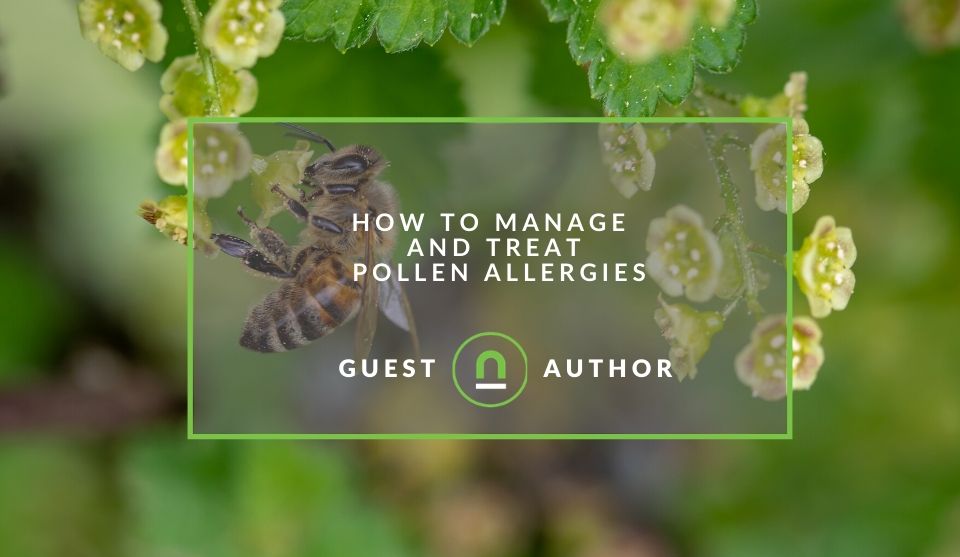Recent posts

Money Talks
Everything You Need to Know About SASSA Status Check
13 April 2025

Mind, Body & Soul
The Genetic Diversity of Cannabis Seeds
12 April 2025

Money Talks
How Small Businesses Can Leverage Blockchain Technology
02 April 2025

Industry Experts
Mastering Personalization in Digital Marketing
31 March 2025
Popular posts
Extravaganza
Trending Music Hashtags To Get Your Posts Noticed
24 August 2018
Geek Chic
How To Fix iPhone/iPad Only Charging In Certain Positions
05 July 2020
Extravaganza
Trending Wedding Hashtags To Get Your Posts Noticed
18 September 2018
Money Talks
How To Find Coupons & Vouchers Online In South Africa
28 March 2019
How to Manage and Treat Pollen Allergies
11 February 2020 | 0 comments | Posted by David V. Hoang in Doctors Orders
Pollen Allergies, also known as seasonal or spring allergies, are the conditions involving an allergic reaction to the pollen of certain plant species. Pollen allergy is a seasonal allergy and usually occurs during spring, summer and fall, when many of the trees release pollen in the air and can trigger an allergic reaction in which the patient experiences inflammation of the nasal pathway and discomfort in breathing.
Understanding pollen
Pollen is the primary cause of spring allergies. Pollen is the reproductive material of wind-pollinated plants released in the air to fertilise other plants or to spread the seeds in the broader area. This process is known as cross-pollination, and while some plants can self-pollinate through their pollen, others need to fertilise another of their species.
Some of the most common grass release pollen, weeds and trees and those with the allergy are affected by the pollen of a wide variety of species. Pollination also occurs through insects in such plants, but such species pose no threat to people with pollen allergies.
Pollen can cover a considerable distance and can reach very high altitudes. Therefore, it is difficult to escape these allergenic completely, but different cities or towns tend to have different pollen density. Some of the plant species commonly found to cause pollen allergies are ash, oak, ragweed, sagebrush, tumbleweed, grasses such as redtop and Bermuda grass and mountain cedar.
Hay fever or seasonal allergic rhinitis
The condition that pollen allergies trigger is commonly known as Hay Fever. The condition is more accurately known as Allergic Rhinitis and involves the inflammation of the nasal airways and the mucous membrane of the nose. Pollen is not the only cause of the condition and only triggers it seasonally. Other causes include indoor allergens such as dust mites. The condition is pretty common, and around 30% of Americans are estimated to be suffering from it.Pollen allergies signs and symptoms
The following are some of the most common seasonal allergy symptoms.- Inflammation around the nose, ears and sinus cavities
- Runny nose
- Sneezing
- Watery Eyes
- Itchy Throat, Nose and Eyes
- Postnasal drip
- Nasal Congestion
- Occasional loss of sense of smell and taste
Pollen allergies complications
Pollen allergies can lead to the dev/elopment of asthma. Among children, the condition can worsen into sinusitis and ear infections. Pollen allergies diagnosis The diagnosis of pollen allergy is primarily carried out by checking for the symptoms of the condition.
Pollen allergies and skin test
The allergy is confirmed through Skin Testing, which allows narrowing down the allergens responsible for the condition so that the physician can be sure that it is the pollen that is causing the allergic reaction. Skin testing involves very little irritation and is carried out, and the reaction of the skin is tested by exposing it to a small quantity of an allergen. Prick-puncture is the most popular and accurate method of Skin Testing.Pollen allergies and blood test
If Skin Testing is not suitable in any case, then a blood test for IgE antibodies is recommended, which are released as an allergic reaction.Pollen allergies management
People suffering from the condition are always keen to learn how to get rid of pollen allergies. It is something that they have to learn to live with while fighting its symptoms because the allergy never completely goes away, except in some cases after the Immunotherapy. However, there are ways which can help minimise their occurrence and intensity.
Nevertheless, one of the most effective ways to get rid of spring allergies is to avoid the allergen as much as you possibly can. This is true for any other allergies as well, since the allergens cannot be eliminated from the world. If possible, people with pollen allergies should consider moving to locations with lesser pollen count during peak seasons.
Pollen allergies treatment
Once you find yourself suffering from an allergic reaction in Seasonal Allergic Rhinitis and are diagnosed with it, then you should follow the treatment as prescribed by your physician.
Avoiding allergens can be difficult in the case of pollen allergies, and that is what makes the treatment of the condition caused by them to be of critical importance. There are several drugs used to curb the symptoms of the condition.
Antihistamines
Antihistamine drugs attack the effect of histamine on the surrounding tissues affected by the allergic reaction. These drugs do not interfere with the allergic reaction and the triggering of histamine in the body in the process, so it does not prevent the natural defensive mechanism of the body but only protects its ill effects on healthy tissues.
A side effect of antihistamines is mouth dryness, drowsiness and sleepiness. Examples include Diphenhydramine, Dexbrompheniramine and Clemastine. Drugs like Cetirizine and Azelastine Nasal Spray are known to reduce the side effect of sleepiness to some degree.
Anti-inflammatory and decongestant medicine
Inflammation almost always occurs in an allergic reaction, and that makes the prescription of anti-inflammatory medicine indispensable. Cortisone nasal spray is an effective medicine, which is also a decongestant. Ipratropium nasal spray is another essential medicine.
Immunotherapy
When anti-inflammatory medicine and other drugs are not tolerated. A lengthy immunotherapy or allergy desensitisation treatment is administered for curbing the symptoms. The treatment involves injecting the affected person with allergy reactions to make the immune system of his or her body used to the allergen. Around 80% of the cases respond successfully to Immunotherapy.
About the author
I’m David Hoang, an allergy and asthma specialist. I have a lot of patients in different countries all around the world. Besides, I’m keen on describing different types of allergies and their treatments on custom dissertation writing service. I think that it can help people who suffer from allergies feel better.
Tell us your story
Would you like to write for nichemarket just like David has? Find out how to submit a guest post and when you're ready, you can contact us.
Are you looking to promote your business?
South African medical businesses can create your free business listing on nichemarket. The more information you provide about your business, the easier it will be for your customers to find you online.
Registering with nichemarket is easy; all you will need to do is head over to our sign up form and follow the instructions. If you require a more detailed guide on how to create your profile or your listing, then we highly recommend you check out the following articles.
Recommended reading
If you enjoyed this post and have time to spare why not check out these related posts and dive deeper down the rabbit hole that is health and hygiene.
- The Best Diet To Combat Arthritis
- Google Brings Some Colour To Medical Knowledge Cards
- 10 Benefits of Hemp Seed Oil for Great Health
- What You Must Know about Immune Response
Tags: Allergies , Guest Post
You might also like
How Small Businesses Can Leverage Blockchain Technology
02 April 2025
Posted by Nicholas Tay in Money Talks
Unlock growth with blockchain! Discover how small businesses can use this tech for secure transactions, supply chain transparency and innovative solu...
Read more4 Types of Essential Socks Every Man Should Own
25 March 2025
Posted by Candice Reed in Fashionista
Upgrade your sock drawer! Discover the four essential sock types every man needs for style & comfort. From dress to athletic, we've got your needs co...
Read more{{comment.sUserName}}
{{comment.iDayLastEdit}} day ago
{{comment.iDayLastEdit}} days ago
 {{blogcategory.sCategoryName}}
{{blogcategory.sCategoryName}}

